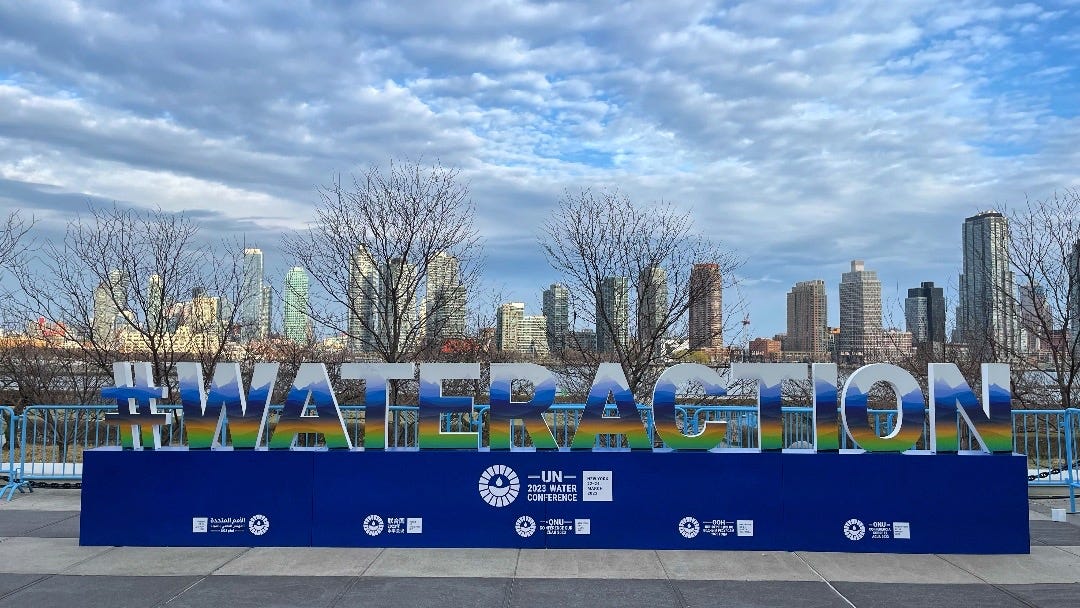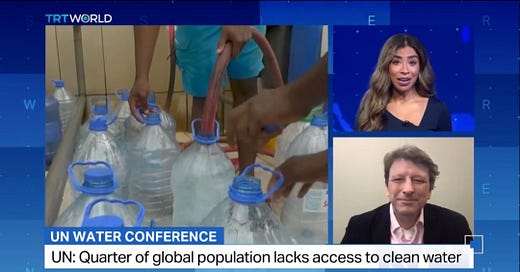While in New York a few days ago, I was interviewed by TRT World Television about the UN 2023 Water Conference. During the interview, we discussed the alarming number of people who still don't have access to clean water and sanitation, particularly in low-income countries, and the steps that need to be taken to address this global crisis.
The lack of access to clean water and sanitation affects millions of people around the world. According to the World Health Organization (WHO), a quarter of the global population, more than two billion people, lack access to safe drinking water. Twice as many, about half of humanity, lack access to safe sanitation. In low-income countries, one of the top water challenges is untreated wastewater, which spreads diseases like cholera.
So, how can we fix these problems? A conference of thousands of people spoke about it for three days, and I had about four minutes in the interview. No single answer would have been sufficient for a global challenge that affects so many people, so I first mentioned a few numbers to make the listeners aware of the scale of the water crisis. I noted that every two and a half minutes, a child under five dies from diarrhea caused by unsafe water conditions and poor hygiene and sanitation.
Stop underpricing water
And then, I focussed on the need for more coherent and wise policies to deal with water sharing between countries because often, countries use water that originates in another country or flows through their land before it enters the sea. It also means that many poor people without access to water should be helped and subsidized. However, we must be careful with how we use water and support it because too many subsidies for companies are already harmful to water use, such as subsidizing too much water for agriculture, which often leads to wastage. Therefore, we must use water better in one place to have more water in another. Water is a human right, but valuing, subsidizing, or pricing is essential if we want everyone worldwide to have access to water.
This is also one of the findings of the Global Commission on the Economics of Water, which published a landmark report during the conference. "Turning the Tide" warns that the world is on the verge of a water disaster, with demand for fresh water predicted to outpace supply by 40% by the end of this decade. One of the authors' conclusions is that "we must manage the global water cycle as a global common good, to be protected collectively and in the interests of all."
The Netherlands, Tajikistan, and the UN
The lack of access to clean water is a solvable crisis, but it requires good cooperation. This is why the governments of the Netherlands and Tajikistan, together with the United Nations, have called for everyone worldwide to work on this issue. And to be practical, we cannot solve this crisis by meeting just once, for the first time in about 50 years, and by making only some statements before going home. So instead, this conference was designed to be practical, to work towards solutions instead of discussing new aims and formulations of what we should do.

That is also the spirit of the main result of the conference: the Water Action Agenda. The last time I checked, more than 600 commitments were registered, and the list is still growing. I like talks that result in concrete cooperation between different parties that put down on paper what they will do, when, and where.
We must consistently treat water as a top priority, especially since the enormous water challenges the world faces are directly related to several other crises impacting each other, many of which are worsening. One fundamental way to progress is to step up our efforts. While there has been progress on some water-related issues, such as more people getting access to sanitation, it is too slow. We need to do four times as much as we are now. Moreover, the situation is worsening in many other water challenges, often related to the climate crisis, energy, and other issues such as equality and women's rights. Therefore, we must take a holistic approach and look at all these issues.
Climate change
If we, for instance, solve climate change, we would solve many water problems. But it also works the other way around. If we take good care of water, such as wetlands, we can capture a lot of carbon that would otherwise end up in the atmosphere and worsen climate change. So there are a lot of interrelated cycles that we all have to tackle together.
Therefore, we must implement more clever policies to help us work together better. We need much better cooperation and care for the world's most vulnerable people because we promised to leave no one behind. And this conference, with its concrete Water Action Agenda, was a landmark event to better understand the water challenges and resulted in an agenda of work with concrete commitments.
This is the interview at TRT World:
I write this newsletter because I believe that together we can do better on this beautiful but fragile planet.
If you are a paying subscriber: thank you for your support!
If you are not, please consider supporting this initiative by taking a paid subscription.








You write : “I like talks that result in concrete cooperation between different parties that put down on paper what they will do, when, and where.” And I fully agree with your view. This UN conference in NYC led to advancements in treating water and wastewater and that’s one aim reached ! Bravo and thanks for all your involvements.
Thank you for your straightforward words of wisdom: "water is a common good."
Thanks too for making the striking point that "before this TRT segment is over, two children will have likely died from lack of clean water."
As duly noted, the issue is solvable if we just have the political will and leadership to take the right action. It is so frustrating to be in the U.S. where politicians waste time and taxpayer funds to manufacture "culture wars" and ban books instead of spending time and money on resolving real matters of (dire) consequence, like clean water.